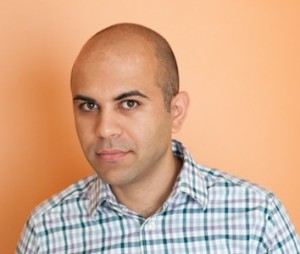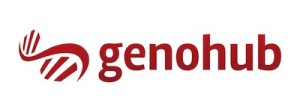
Meet Pouya Razavi, co-founder of GenoHub, a recently launched online marketplace that connects researchers and DNA sequencing equipment owners. Pouya was born and raised in Iran and came to the United States at the age of 18. He first lived with his family and studied in Buffalo, New York, then transferred to University of Illinois at Urbana-Champaign to pursue his interest in computers and electronics. He completed a bachelor’s in Computer Engineering and followed it up with a master’s in Electrical Engineering. Although UIUC is one of top engineering schools in the country, and this was among the reasons Pouya chose it, he no longer believes that where you go to school matters – maybe to get your first job, or for certain industries, prestige matters, but in engineering, you can prove yourself.
After graduating with his master’s, Pouya was recruited to work at AMD moved to Austin. He stayed with them for years and quit last January. At AMD, he got to experience working with different groups and types of jobs at AMD, but always wanted to start his own company.
 When an old friend from Buffalo, now a molecular biologist, also ended up in Austin, it seemed like it was time to make the switch to entrepreneurship and they started brainstorming the possibilities. They first thought about marketing a genetic test aimed at consumers, but discovered that this space was already saturated with competitors. They then decided to address a gap in the market: DNA sequencing requires expensive sequencers that cost about $500K. Not all researchers have or need their own sequencers and they may not have enough of them to handle peak needs, so many researchers outsource the sequencing. Price varies a lot, so do turnaround times; the sequencers have multiple ‘lanes’ and may take two to three weeks to run and each run costs a lot of money. At times, providers have to wait for customers and customers we unable to compare prices and turnaround times. Both universities and private companies offer sequencing services, and many researchers who are not geneticists need sequencing as part of the their project, but there was no dedicated matching service to connect researchers and providers. This seemed like a perfect problem for an online marketplace – rather like Kayak.com for sequencing. Based on project needs, GenoHub software calculates needed capacity and type of instrument would match clients’ requirements, then allows them to pick by price, location, and availability.
When an old friend from Buffalo, now a molecular biologist, also ended up in Austin, it seemed like it was time to make the switch to entrepreneurship and they started brainstorming the possibilities. They first thought about marketing a genetic test aimed at consumers, but discovered that this space was already saturated with competitors. They then decided to address a gap in the market: DNA sequencing requires expensive sequencers that cost about $500K. Not all researchers have or need their own sequencers and they may not have enough of them to handle peak needs, so many researchers outsource the sequencing. Price varies a lot, so do turnaround times; the sequencers have multiple ‘lanes’ and may take two to three weeks to run and each run costs a lot of money. At times, providers have to wait for customers and customers we unable to compare prices and turnaround times. Both universities and private companies offer sequencing services, and many researchers who are not geneticists need sequencing as part of the their project, but there was no dedicated matching service to connect researchers and providers. This seemed like a perfect problem for an online marketplace – rather like Kayak.com for sequencing. Based on project needs, GenoHub software calculates needed capacity and type of instrument would match clients’ requirements, then allows them to pick by price, location, and availability.
Business model: GenoHub charges providers a percentage of their fee for each match.
Why they are at Tech Ranch: they wanted to work around other startups for serendipity, and after exploring coworking options around Austin, decided that Tech Ranch® was the best match. Although right now they have a clear sense of direction and a list of priorities, they may end up in Venture Builder at a later date to help them grow.
Resources: GenoHub used LinkedIn extensively to find providers and researchers. Even before their official launch a few weeks ago, they received many positive responses and even orders.
Want to learn more about GenoHub? Pouya and a member of his team are one of the many coworkers at Tech Ranch. Come check out our coworking facilities during open tour on Tuesday afternoons!